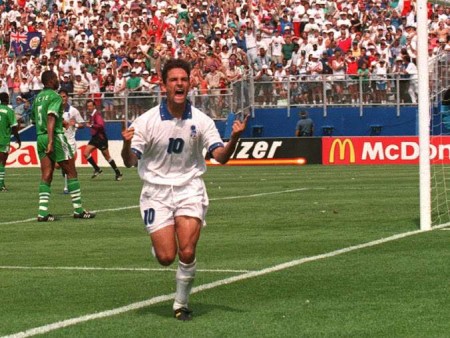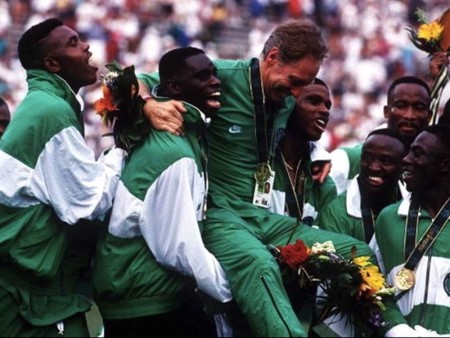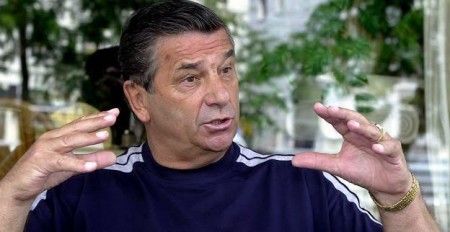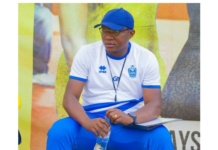Should Nigeria’s Super Eagles go native again?

Johannes Bonfrere has thrown his hat into the ring to take up the reins to lead Nigeria’s national football squad.
Bonfrere, who led the Super Eagles to the Africa Cup of Nations final in 2000 but was sacked a year later, believes he is ‘the right man’ to return Nigeria to the summit of African football following Sunday Oliseh’s sudden resignation a week ago.
The Dutchman was very vocal about Nigeria needing a “capable foreign coach” after Stephen Keshi was sacked last summer. It is now clear that his words were a hint which, having fallen on deaf ears back in July, the 69-year-old is now keen to spell out.
Bonfrere lost his job in 2001 after Nigeria lost a World Cup qualifier in Sierra Leone. The previous year, the Super Eagles lost on penalties to Cameroon in the final of an Africa Cup of Nations tournament they co-hosted with Ghana. The final was played in front of a home crowd in the National Stadium in Lagos.
Bonfere had previously been the Super Eagles’ assistant coach from 1990 to 1994 under compatriot Clemens Westerhof, and the duo managed to win the AFCON trophy at the third time of asking during their tenure. At the 1996 Summer Olympics in Atlanta, he led Nigeria’s under-23 team to a glorious gold medal. But arguments over his salary and team selection made him quit the job in the United States, from where he returned to his native Holland.
“I have worked in Nigeria for a long time in the past and I know what to do to get the Super Eagles flying again,” Bonfrere told a BBC Sport interviewer on the telephone from the Netherlands, adding: “I love Nigeria because that is where my football mentality is most at home and I have a fantastic relationship with the people there”.
Bonfrere is ready to let his work speak for him should the Nigeria Football Federation (NFF) entrust him with the three-time African champions.

“If I am asked to come back, I would have to prove to everyone that my results and performances can win me the support of everyone. You can’t complain about criticism or ask for respect if you don’t deserve it. I want another chance to set a standard that will help improve Nigeria football.
“Someone else will come and struggle because he has no idea where he is going but I’m the man to do it because I have proven that in the past.
“Apart from Stephen [Keshi], the other local coaches have not succeeded because they cannot give what they don’t have to take the team higher.
“Other foreign coaches have also failed because they come with the arrogant attitude of being a world class coach and a big name to perform magic there, and that wrong notion meant they had no passion, desire and the required knowledge to succeed on the job.
“I was very successful because I did not separate myself from the reality. I worked with youth and domestic players; I had faith in my Nigerian assistants and gave my best despite all the challenges.
“No one has done what I achieved and I believe I am the right man to return Nigeria to glory days in Africa and the world” said the Dutchman.
The debate that must be raging amongst Nigeria’s football fraternity has to be whether Nigerian football’s governing body should appoint another home-grown coach following successive acrimonious fallings-out with former national heroes.
NFF president Amaju Pinnick has said the Federation has no plans to appoint a local coach on a permanent basis. Meanwhile, current under-23 coach Samson Siasia will take charge for Nigeria’s Nations Cup qualifiers against Egypt later this month.
Swede Lars Lagerbäck, who helped Nigeria qualify for the 2010 FIFA World Cup in South Africa, was the last foreigner to lead the country’s senior national football team. But Lagerbäck is one of a long list of 18 overseas coaches to take the helm. Fact fans pay attention, here they all are:
– John Finch (England) 1949
Finch led Nigeria in its first international game against Sierra Leone on 8th October 1949, when both countries were under British administration. Nigeria won 2-0. He handed over to Daniel Anyiam who became the first indigenous coach of the national team. Rating: 7/10.
– Les Courtier (England) 1956-1960
The biggest win Nigeria ever recorded took place under Courtier’s guidance, when the ‘Red Devils’ beat Dahomey (now Benin) 10-1 on November 28, 1959. Rating: 6/10.
-Moshe “Jerry” Beit haLevi (Israel) 1960 -61
In 1960, Jerry received an offer to coach the Nigerian national team. In his first match against Ghana, Nigeria was beaten 3-0 in Lagos and the press called for Beit haLevi to be fired. He kept his job and helped build a better Nigerian side. Rating: 5/10.
– George Vardar (Hungary) 1961-1963
Under Vardar, Nigeria suffered tremendously at the hands of Ghana and Sudan. He left the post to be replaced by Daniel Anyiam for his second stint leading the team. Rating: 3/10.
-Jorge Pena (Brazil) 1963, 1972-1973
Pena’s first coming was in 1963, when he managed the team for one year before again taking over between 1972 and 1973. He is credited with trying to bestow Brazilian flair to a flagging national squad. Rating: 5/10.
-Joseph Ember (Hungary) 1965-1968
Under Ember, Nigeria failed to qualify for the Nations Cup in Tunisia in 1965 and in Ethiopia in 1968. His assistant, Peter ‘Eto‘ Amaechina, took over from him and was in charge of the team from 1969-1970. Rating: 2/10.
-Karl-Heinz Marotzke (Germany) 1973-1974
Marotzke came to Nigeria after managing the Black Stars of Ghana between 1968 and 1970. His first major role with the team was between 1970 and 1972. But barely nine months after he had applied for the job on 11th April 1970, he was sidelined. He was redeployed to conduct coaching courses in the states of the Federation while Pena (q.v.) returned to the team. The Eagles were eliminated by Senegal in the preliminary competition for the 1972 Munich Olympic Games under the guidance of Pena. Marotzke remained in the country until he was named a member of the NFA in 1973. Rating: 4/10.
-Othman Calder (Germany) 1974
Following the sacking of the NFA board led by Edwin Kentebe and the disbanding of the team and its technical crew, the new administration hired Calder in December 1974 to prepare the team for the next Nations Cup. His first assignment was to screen the more than 90 players that had been selected from the National Sports Festival held in August of the same year. But in the following year, the coach suddenly abandoned his post and left the country. His employers, the National Sports
Commission, had been unable to meet his demands which included an official car, a house and a monthly salary of N1,700. Rating: 2/10.
-Jelisavic ‘Tiki’ Tihomir (Yugoslavia) 1974-1978
Popularly called Father Tiko, the Slav narrowly missed taking the national team to the Argentina ‘78 World Cup after Godwin Odiye scored an own goal in a match against Tunisia to put Nigeria out of the race. Rating: 7/10.
-Otto Glória (Brazil) 1978-1982
A former Portugal coach, Glória guided Nigeria through the 1980 Africa Cup of Nations, which the team won in the final in Lagos with a 3-0 win over Algeria. He left following poor performances at the 1982 Nations Cup in Libya. Rating 8/10.
-Gottlieb Göller (Germany) 1981

Göller came to Africa to manage the Togolese national team in 1972. He was later hired by German construction company, Julius Berger, to coach its football team in Lagos between 1979 and 1981. He was engaged to coach the Nigerian team after a 2-0 loss in Lagos to Algeria in the first leg at the last qualifying series for the 1982 World Cup in Spain. Predecessor Otto Glória (q.v) had been sidelined for the return leg tie but the team lost again 2-1 in Constantine, Algeria. Göller later left the country to work in Mozambique and then Togo. Rating: 4/10.
-Manfred Hoener (Germany) 1988-1989
Manfred Hoener came in after the NFA had experimented with coaches Adegboyega Onigbinde, Chris Udemezue and Patrick Ekeji, who had failed to win any major tournament. He began his coaching career in 1972 and worked in Austria, Turkey, Egypt and Thailand before coming to Nigeria. His arrival in 1988 was as controversial as his disappearance later that year. Regarded more as a physical trainer than a tactician, he led Nigeria to a second place finish at the Maroc ‘88 Nations Cup. Rating: 6/10.
-Clemens Westerhof (Holland) 1989-1994.
The most successful coach to manage the team. Having failed to lead the team to qualification for Italia ’90, Westerhof showed his determination to be at the next World Cup by rebuilding the team. His first remarkable success, however, was reaching the Nations Cup final in 1990 in Algeria where Nigeria lost 1 – 0 to the hosts.
As the rebuilding project continued, Nigeria appeared to be on their way to a second consecutive Nations Cup final when Ghana recovered from a 1-0 deficit to take the semi-final 2-1. Nigeria had to settle for winning the bronze medal match, but it was a second relative success when put in context and was the impetus for a name change from the Green Eagles to the Super Eagles.
The revised moniker appeared to be an apt choice when the Super Eagles won the 1994 Nations Cup in Tunisia, beating Zambia 2-1 in the final. Cause for celebration as this was, Nigeria had achieved the feat before, in 1980. So it was the nation’s qualification for its first World Cup that was 1994’s big story.
Ably assisted by Jo Bonfrere, Westerhof’s team exceeded many expectations in the US, winning a World Cup group that included Argentina (featuring an ephedrine-enhanced Diego Maradona). It was, however, a tournament in which eventual finalists Italy decided to have a slow start, meaning their third place in their group pitched them against a group winner in the first knock-out round. Plucky Nigeria drew the short straw, yet almost achieved the unthinkable by holding a 1-0 lead until 2 minutes from the end of normal time. Italy went on to score the only goal in Extra Time, but the heady early nineties will remain long in the memory of Nigerian football fans.
Westerhof was later to have well-publicized bust-ups with some of the Super Eagles’ feted ‘stars’ and was overruled by the NFF on more than one occasion when he axed players, which led inevitably to a breakdown in the relationship between coach and federation. Rating: 9/10.
-Johannes Bonfrere (Holland) 1995-1996
The Dutchman came to the country to assist Westerhof but he got his chance to be in charge of a team when in 1991 he was appointed to coach the Super Falcons. His achievements with the women‘s team gave him the opportunity to be in charge of the Olympic football team in 1995, and the following year he led the team to Gold at the Atlanta‘96 Olympic Games. He left Nigeria unceremoniously after he was hired to manage Qatar between 1996 and 1997. When Thijs Libregts was fired in 1999, Bonfrere was hired to manage the Super Eagles again, leading them to a second place finish at the 2000 Nations Cup co-hosted by Nigeria and Ghana. Nigeria lost the final to Cameroon in a penalty shootout. He subsequently left the team to coach the national team of the United Arab Emirate in 2001, leaving his assistant, Shaibu Amodu, to take over the team. Rating: 7/10.
-Philippe Troussier (France) 1997
Troussier’s success with African clubs earned him the nickname ‘White Witchdoctor‘. He was engaged by Nigeria in 1997 and guided the Super Eagles to qualification for the 1998 World Cup. He left Nigeria the same year under controversial circumstances, leaving the NFA to begin a search for another foreign coach. He managed three other national teams between 1997 and 2002. Rating: 5/10.
– Bora Milutinovic (Serbia) 1998
A Serbian, popularly referred to as the Miracle Worker, Milutinovic had taken three teams to the World Cup before joining Nigeria in 1998. He later guided China to the Mundial in 2002. The coach was hired simply for his World Cup experience; needed to guide the Super Eagles through France‘98. He hardly made any changes to the squad he inherited from Troussier and it was not a surprise that the team failed to go beyond the second round of the competition. Rating: 4/10.
– Thijs Libregts (Holland) 1998-1999
Libregts had managed nine other teams – including the Dutch national team – before taking charge of the Super Eagles in August 1998 following a disappointing World Cup under Bora Milutinovic (q.v.). Libregts was dismissed by Olympiakos in 1995 and was jobless until he was hired by Nigeria. He was relieved of his job after winning just two games in five matches in the build-up to the 2000 Nations Cup. Rating: 3/10.
– Berti Vogts (Germany) 2007-2008
The German had vowed never to return to football management after dumping the Scotland team, but a lucrative deal with Nigeria made him change his mind. His four-year contract came to an abrupt end 13 months later after he resigned following the Super Eagles’ poor performance at the 2008 Nations Cup in Ghana. Rating: 3/10.









